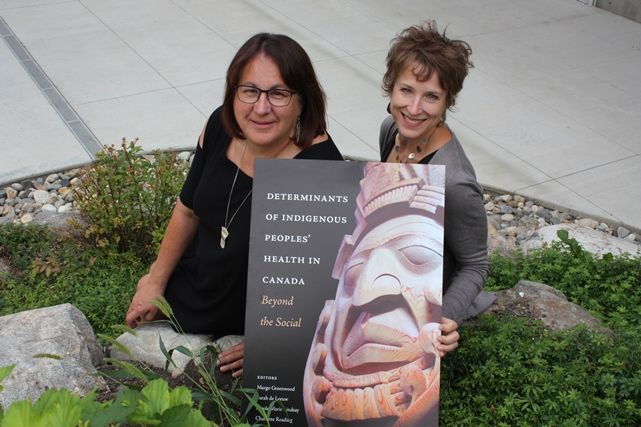New textbook gives voice to Indigenous perspectives on health
Prince George, BC - Post-secondary students across Canada will benefit from a groundbreaking new textbook on Indigenous health created in part by two University of Northern British Columbia (UNBC) professors. Doctors Margo Greenwood and Sarah de Leeuw, co-editors, have gathered perspectives and experiences of Indigenous people around the country to provide an in-depth look at the realities of health and healthcare in Aboriginal communities.
The new textbook, Determinants of Indigenous Peoples’ Health in Canada: Beyond the Social, published this summer, seeks to move academic discussion beyond established social health determinants, such as income and education, to help explore impacts of other factors, including colonization and colonialism, environment, geography, and culture.

Dr. Margo Greenwood (left) and Dr. Sarah de Leeuw. Download high-resolution image
“Where prior publications have included one or two chapters, this book is fully focused on the Indigenous health experience,” said Greenwood, a professor of Education and First Nations Studies at UNBC and vice-president of Aboriginal Health at the Northern Health Authority. “It fills a huge gap of information in the Canadian health education landscape, offering students a greatly expanded opportunity to critically think about Indigenous patient care and hopefully apply this knowledge to their future practice.”
“What makes this book special is that it is written by Indigenous people about Indigenous people and their viewpoints on health,” explained de Leeuw, an associate professor in the Northern Medical Program, a partnership between UNBC and the University of British Columbia Faculty of Medicine, and in UBC’s School of Population and Public Health. “It also provides an artistic lens on health issues rarely seen in academic medical text. The book includes creative voice in the form of poems, stories and other art that provide a unique and serious reflection on health status.”
The book features contributions from First Nations, Inuit, and Métis writers, with chapters ranging from scholarly papers by Aboriginal Health research experts to reflective essays by Indigenous leaders and insights on well-being shared through community members.
“This collection of material shares a wealth of Indigenous experience that has traditionally only existed as oral knowledge in our communities,” added Greenwood. “These are stories that document resilience, strength, and solutions from a health context, offering a richness of information far beyond what we would ordinarily see in discussions centred only on the basic social determinants of health.”
Determinants of Indigenous Peoples’ Health in Canada: Beyond the Social was co-edited with Dr. Charlotte Reading, a professor at the University of Victoria and Director of the Centre for Aboriginal Health Research, and Nicole Lindsay, a doctoral candidate at Simon Fraser University and former research associate at the National Collaborating Centre for Aboriginal Health.
Dr. Greenwood is the academic lead of the National Collaborating Centre for Aboriginal Health (NCCAH), which supports First Nations, Inuit, and Métis public health renewal and health equity through knowledge translation and exchange. De Leeuw also works with the NCCAH as a research associate. The NCCAH is housed at UNBC as part of a national network of six centres focused on strengthening Canada’s public health system.
“UNBC is committed to promoting ongoing discussion and engagement around Aboriginal relations and initiatives,” said UNBC President Dr. Daniel Weeks. “This new textbook highlights an opportunity to integrate Indigenous perspectives within classrooms that are addressing Aboriginal-related health experiences.”
The book is published by Canadian Scholars’ Press, with all royalties going to the First Nations Child and Family Caring Society of Canada.
-30-